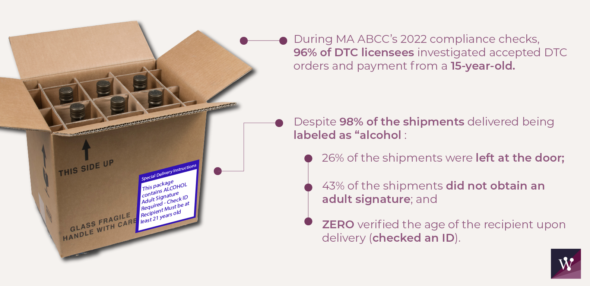Some States Going After Direct-to-Consumer Shipping

Wine & Spirits Wholesalers of America reported that across the country, lawmakers and regulators are sounding the alarm about the dangers of direct-to-consumer (DTC) alcohol shipping.
Their concerns? Since the advent of DTC wine shipping over a decade ago, states have lost millions in tax revenue, underage consumers have gained greater access to alcoholic products, and the risk of adulterated products entering the marketplace has skyrocketed.
Recently, South Carolina State Representative Weston Newton spoke on the house floor while displaying a bourbon shipment he had received from an online retailer. Representative Newton stated that all he “had to do was type in his credit card number” and that the delivery driver never asked for the recipient’s proof of age before leaving the bottles, highlighting the lack of legal parameters in state law for home delivery of beer, wine, and liquor.
Last year, after passing common carrier reporting enhancements, Oklahoma State Senator Bill Coleman advocated that these changes were “vital to combat the dangers associated with direct-to-consumer shipments,” while State Representative T.J. said the newly enacted language ensures that “Oklahoma can identify and pursue enforcement actions against unlicensed, unscrupulous actors who ship illegally to consumers, harming public safety.”
Oklahoma is one of 18 states whereby common carriers (i.e., FedEx, UPS) are required to report each online alcohol order shipped directly to a consumer to state regulators, the wholesalers organization said in a news release. These common carrier reports grant regulators the ability to differentiate between legal and illegal shipments by identifying the originating shipper. In doing so, shipments can be identified that undercut the state’s law-abiding industry members and compromise public safety, while regulators can ensure that shippers are remitting applicable state taxes. Tracking illegal shipments is nearly impossible without common carrier reports.
Additionally, the Texas Alcohol Beverage Commission (ABC), after examining carrier reporting data from the 4th quarter of 2022, found a total of 304,481 unreported or illegal wine shipments into Texas for the quarter – which would equate to 1,217,924 annually (57% of all wine shipments into Texas).
In 2020, the Tennessee ABC sent numerous cease and desist letters to unlicensed businesses shipping to consumers and had to request FedEx and UPS to stop illegal alcohol shipments to Tennessee residents from an online retailer after discovering it was responsible for 240 separate illegal shipments in one year.
State ABC’s have also gone so far as conducting their own sting operations to examine the extent of illegal direct-to-consumer alcohol shipments in their state. In 2023, Massachusetts ABC chief investigator Ted Mahoney reported on the results of compliance checks his organization conducted on beverage alcohol shipments, with startling results:
- 96% of the e-commerce platforms accepted the DTC order and payment from a 15-year old consumer.
- 43% of the beverage alcohol shipments did not obtain adult signatures.
- 26% of the shipments were left at the consumer’s doorstep.
- Zero shipments verified the age of the recipient by checking an ID upon delivery.

“The bottom line is that we have alcohol coming into our state from unlicensed entities and individuals throughout the country and the world,” Mahoney said. “We have to get back to the basic understanding that this can be a dangerous product and the principle that alcohol should be sold and delivered by responsible entities and individuals that are properly licensed and trained. This should be the highest priority for state alcohol regulators.”
On October 28, 2000, Congress passed the 21st Amendment Enforcement Act allowing state attorneys general to bring civil action in federal court against out-of-state entities to enforce violations of their state laws relating to the importation or transportation of alcohol. WSWA supported the Act’s passage 20 years ago and actively encourages its use as an enforcement tool today because the illegal shipment of alcohol across state lines creates a wide range of transparency, accountability, health and safety problems for regulators and consumers.








